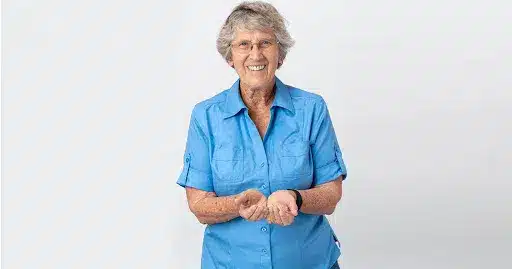
Ruth Beaglehole is a consultant trainer and parenting expert in both the private and public sector for over 50 years, she was the founder of eco parenting and education in organizations, supporting parents and teachers to break the cycle of early family violence, by learning the philosophy of nonviolent child raising. Ruth has led parenting groups for decades, and has taken the work of non violence in raising children to communities in New Zealand, India, and the Democratic Republic of the Congo, and more.
Learn more about Ruth: http://ruthbeaglehole.com/
What would feel important for you, for people to come away from it, feeling?
“We are living in a time of fear and uncertainty, we have no idea what's to come. You know, we know what we're living through at this moment, but we know we're living through uncertainty. And I really value the concept of strength of heart. And that as parents, what is that? What does that strength of heart look like, as we support our children through this time, an unprecedented time, an unprecedented time and many of our histories. And yet, I believe that we can find strengths and ways to reframe what's happened so that we actually can give our children something very special during this time.”
People are saying keep your stress levels down and at the same time, you're just kind of seeing this chaos everywhere? And so I'm curious, have you ever experienced, you know, in all of your years of supporting parents? Have you ever experienced anything like this?
“Well, you know, probably yes, to different degrees. I remember, you know, when llusd got shut down, you know, over the gun violence issue. I think, actually, maybe not this big enough, but sometimes it feels like we're all walking on a tightrope, you know, and there are times personal issues, personal issues, you know, maybe a family's going through a divorce or mourning, you know, a loss, where it feels huge, and it feels full of fear and uncertainty. And what's incredible about this one is that this is community wide. This is actually worldwide.”
And so just being online, I've been, I've been seeing, like, you know, just a lot of shaming of parents, and not so much that empathy. And so it's, it's also easy for me to slip into that shaming, right? Or that, that judgment for parents when I go to Target and there's no diapers, and I'm like, oh, and so, um, what do you think, you know, just in the spirit of non violence, what, what are some of the things that we can do, I think, to kind of embody that empathy and to release those kinds of judgments.
“I wanted to share maybe this concept of finding the yes behind the No. You know, I was thinking about that, you know, there's no, we can't go to the playground. No, yes, we are home. But no, we're not going to go to the playground. No, you can't have playdates. You know, just a matter of like, No, we can't go and get an ice cream. We can't do many of the usual things that we do to support our family and our children. And so how do we reframe this? How do we find the yes behind it? The yes is, that we're doing everything to protect our families, they're all making lists, and all the things that we actually can do that we know if we are able to create play opportunities within our homes, you know, with were able to access different maybe learning, you know, the what is it the Discovery Channel and learning about different animals? Or, you know, I don't know about the animal world or things like that, you know, what is it that we can do? The same time holding the grief for children, the mourning about what they are, what are the limitations, really having them understand what the social sort of isolation actually means. educating them with some facts, but making sure that we're not terrifying them, we're actually saying, this is what we're doing to keep our family healthy. And that's our most important thing is how do we keep our family healthy? And because we're doing that, these are some of the things we can do. And of course, as children get older, you know, they want more information, and how do we sensor, in a sense, what we want to tell them? So we're not, you know, it's not, it's not knocking at the door? No, we are actually keeping ourselves safe. We're doing the things that we can do as a family. And yes, that might mean that we're not going to see grandma and grandpa right now, you know, like holding the, the grief in the morning for some of the loss.”
But what could we do about families that maybe don't sense that community? And maybe don't have those tools to be able to, to regulate or to, you know, do their own work?
“It is so hard to manage our own fear and then be able to pause and breathe and really be there for our children. And it'd be you know, and there will be times that we lose it, you know, but we remember that we can always go back and repair, we can always go back and do a do over, none of us are going to do this perfectly.” … “I don't have any easy answers for this, this is a practice. And when we're living with such stress and such fear, and maybe worrying about loved ones, maybe worrying about people that we know who're going to get sick, you know, it's, it's asking a lot of us, it's asking a lot.” … “I do know, some things are going to be important. Some things like keeping routines in the family, keeping, keeping the narrative, the day to day story, and what's happening in the family alive, making books for younger children, talking with older children letter writing to people they love, you know, when they begin to miss their friends, you know, ways that we can emphasize connection. I think it's really important at a time when we're sort of being told, we have disconnection. But that's one kind. That's social disconnection in person. That doesn't mean disconnection from all these other ways that we have to keep some sense of normality, routines, keep some sense of normality. And for those of you who have children who are going to be home from school, you know, they're going to be I bet you're going to fight screens. Gonna have that screen up all day, we actually are going to loosen some of our tight lists about some of those things. If we don't have board games in the house, we might have to with all the kids at least, create some games,”
“This is a period where we're going to be called on to find patients in places that we haven't had to find them in the past. And along with that patience, defined empathy and understanding”
So I'm just trying to think about, like, how to be able to hold empathy for them, and also create these limits to protect our families. And really remember what the priority is, and you had mentioned this at the beginning, you know, the things that we could say to our children, you know, grandpa's not only those not able to come today, or he is not able to come today because of these things. And so maybe what are some other scripts? What are some other things that we can say to our children?
“What people who know a lot about this virus are asking us to do is, you know, make a book about it, don't think you have to get majorly technical. This is a bug that spreads and people have to be very careful not to catch it. And this is what we're doing not to catch it. with older kids, the language becomes a little more, a little more complex, and maybe they want to know a little more about it. But it's the same message about we're going to do what we've been asked to do to keep ourselves safe and protected. Yeah. And you know, you will find ways to talk about the virus that works for your children, older adolescents might want to do some research into it and really formulate, you know, some adolescence is an amazing time of creativity, they may have some incredible insight, you know, they share. So I think one of the things we don't want to do is make it more complicated isn't then it is for little children
“I think this is something we have to practice a lot isn't that is not to put all of our fear and anxiety for whatever topic and add on our children's shoulders. And yet, we are acting from a place of fear.”… “And so yes, the big picture is a little bit scary. And yet, I want to be a model for my children on how I'm managing that. The problem is, if we're running to the supermarket, getting in the Costco line at six in the morning, you know, or learning to buy over whatever it is in the supermarkets, we're actually communicating very overtly, panic, right? And fear. And so how do we have self awareness, self awareness about ourselves and our feelings and how to manage that,”

